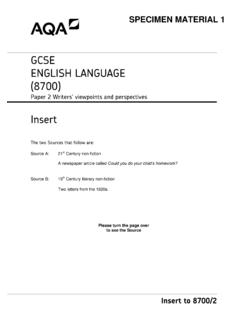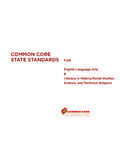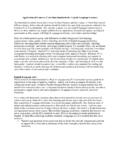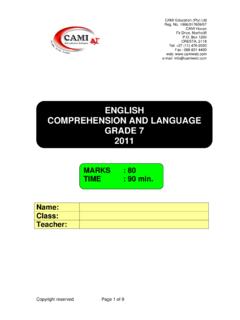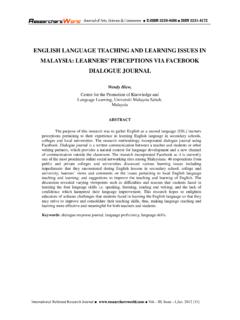Transcription of Why Are More African Countries Adopting English as an ...
1 1 Why Are more African Countries Adopting English as an Official language ? Patrick Plonski, Asratie Teferra, and Rachel Brady Presented at African Studies Association Annual Conference, November 23, 2013 Baltimore, Maryland Patrick Plonski, PhD 287 Wilder Street North St. Paul, MN 55104 651-291-2713 Abstract At least 26 African Countries list English as one of their official languages. Most recently Rwanda, long a French-speaking country, has switched to English as an official language . Burundi and Gabon are switching from French to English , and South Sudan is Adopting English . The use of English as an official language in schools, universities, and government offices across the African continent raises a number of key issues. Why are African Countries determining that English might be preferable to French, and why preferable to local languages?
2 What are the positive and negative impacts of these decisions? Keywords: Africa, education, development, English , language of instruction 2 Introduction In fall 2010, President Bongo Odimbwa of Gabon visited President Paul Kagame in Kigali, Rwanda. The purpose of the trip was to discover how Rwanda has found success in its development goals, but more interestingly, how Rwanda has implemented English as an official language . President Odimbwa recognized English as a necessary working language and as important for diversifying our partnerships, ensuring that the people of Gabon are armed and better armed (Hasselriis, 2010). In a country where the majority of the million citizens speak French, Gabon s increased interest in promoting the English language is telling. In Rwanda, a fellow Francophone nation, English has been used as a language of instruction in the school system since 2008.
3 Why is it that Countries in Africa, and increasingly those that were not colonized by the British, are placing increased emphasis on the role of English in their political, economic, and education policies? What does such a trend mean for the future of English in Africa? Background Status of Languages in Africa The purpose of this paper is to explore the increased demand for English language education and communication across Africa, including in formal settings such as schools and government offices, and in informal settings such as business. In addition to previously published works, this analysis will draw upon primary source material secured from Books For Africa, which has seen continued and increased demand for English - language educational materials across Africa, including to Countries that have not had a history of English - language usage.
4 Finally, it should be stressed that the authors of this paper do not take a position on whether these trends are the proper course of action as the authors maintain that these decisions are obviously best made by Africans themselves. This 3 paper does seek however to report obvious existing trends and seeks to analyze why they are occurring and what the ramifications are and will be for the future. The Global language English has become the second language of everybody. It s gotten to the point where almost in any part of the world to be educated means to know English , according to Mark Warschauer of the University of California, Irvine (Mydans, 2007). As the world continues to become ever more interconnected, the spread and importance of English on every continent becomes increasingly more pronounced.
5 The link between globalization and English is tangible. It is a process that, as Mydans (2007) states, started with the dominance of two successive English -speaking empires, British and American, and continues today with the new virtual empire of the internet. The most powerful aspect of the English language s role, as linguist David Crystal (2004) points out, is the speed at which the language has spread the globe. By 2050, it is projected that nearly half of the world s population will be proficient in English (The Triumph of English , 2011). The power of the English language is seen in the political, economic and educational spheres of the global stage. Politically, English is an official or working language of most international political gatherings throughout the world (Crystal, 2003) and 85% of international organizations use English as the language of official communications (The triumph of English , 2011).
6 Economically, the Harvard Business Review calls English the global language of business (Neeley, 2012). As corporations expand the scope of operations to various Countries , geographically dispersed employees have to work together to meet common goals (Neeley, 2012). A common working language is a requirement for that cooperation. Furthermore, as developing Countries seek to compete in the global marketplace, English is the language in which most negotiation and marketing schemes must take place. English is also the primary language of academia, as the majority of 4 academic publications are written in English (Negash, 2011). As Crystal (2003) asserts, access to knowledge is the business of education. When we investigate why so many nations have in recent years made English an official language or chose it as their chief foreign language in schools, one of the most important reasons is always educational.
7 Furthermore, Coleman (2010), writing for The British Council, highlights the link between Countries educational and economic policies on English . Coleman cites a study that found that Countries pursuing an economic strategy based on exports and the attraction of foreign capital should adapt their language education policies to the requirements of that economy strategy (Coleman, 2010). Spread and emphasized via internet, global political systems, and colonial traditions, English has become the language of globalization. This study will further investigate how English , as the global language , manifests itself on the African continent. As more Countries in Africa adopt English as an official language , and as more still write English into the public school curriculum, it is worthwhile to examine the economic and political reasons for these important linguistic shifts and the possible ramifications such choices have for the future of language in Africa.
8 Definitions Some key definitions will now be provided to clarify terminology. The mother tongue is defined as the language one learns as a child growing up in the home. UNESCO defines the mother tongue as the main language spoken in the home environment and acquired as a first language , sometimes called the home language (UNESCO, 2013). In some African Countries , such as Kenya, the mother tongue is also referred to as ethnic , tribal , local , and/or vernacular language (Cleghorn, Merritt, & Abagi, 1989). Official language is defined as one or more languages that a country utilizes as an official form of communication in education, government, or commerce. UNESCO (2013) defines official language as a language designated by law to be employed in the public domain. This is distinct from a national language , which is a language spoken by a large part of the population of a country, 5 which may or may not be designated an official language (UNESCO, 2013).
9 language of instruction (LOI) is defined as the language in which subject matter is taught in a public or private school setting. UNESCO defines LOI as language (s) used to convey a specified curriculum in a formal or non-formal educational setting (UNESCO, 2013). Second language has traditionally been used in different contexts and can mean (a) the second language learned (chronologically); (b) the weaker language ; (c) a language that is not the mother tongue; or (d) the less used language . English on the Rise in Africa Today, 26 Countries in sub-Saharan Africa use English either as an official language exclusively (like Nigeria and Ghana) or as an official language alongside another African language (like in Kenya or South Africa) (Negash, 2011; World Factbook, 2013). Several of those Countries are traditionally Francophone nations (like Cameroon and Seychelles).
10 However, English is used for communicative purposes in some 53 Countries in Africa. As Negash (2011) states, as an official language of the African Union and as an international language , English is important for the continent. The 26 African Countries that currently utilize English as at least one of its official languages include the following (World Factbook, 2013): 6 Botswana Cameroon Eritrea The Gambia Ghana Kenya Lesotho Liberia Madagascar Malawi Mauritius Mozambique Namibia Nigeria Rwanda Seychelles Sierra Leone Somalia South Africa South Sudan Sudan Swaziland Tanzania Uganda Zambia Zimbabwe The world s top ten languages (defined as the number of speakers of the language regardless of mother tongue) are Chinese (Mandarin), English , Hindustani, Spanish, Russian, Arabic, Bengali, Portuguese, Malay-Indonesian, and French (Fishman, 2001; Krauss, 1992; World Factbook, 2013).



